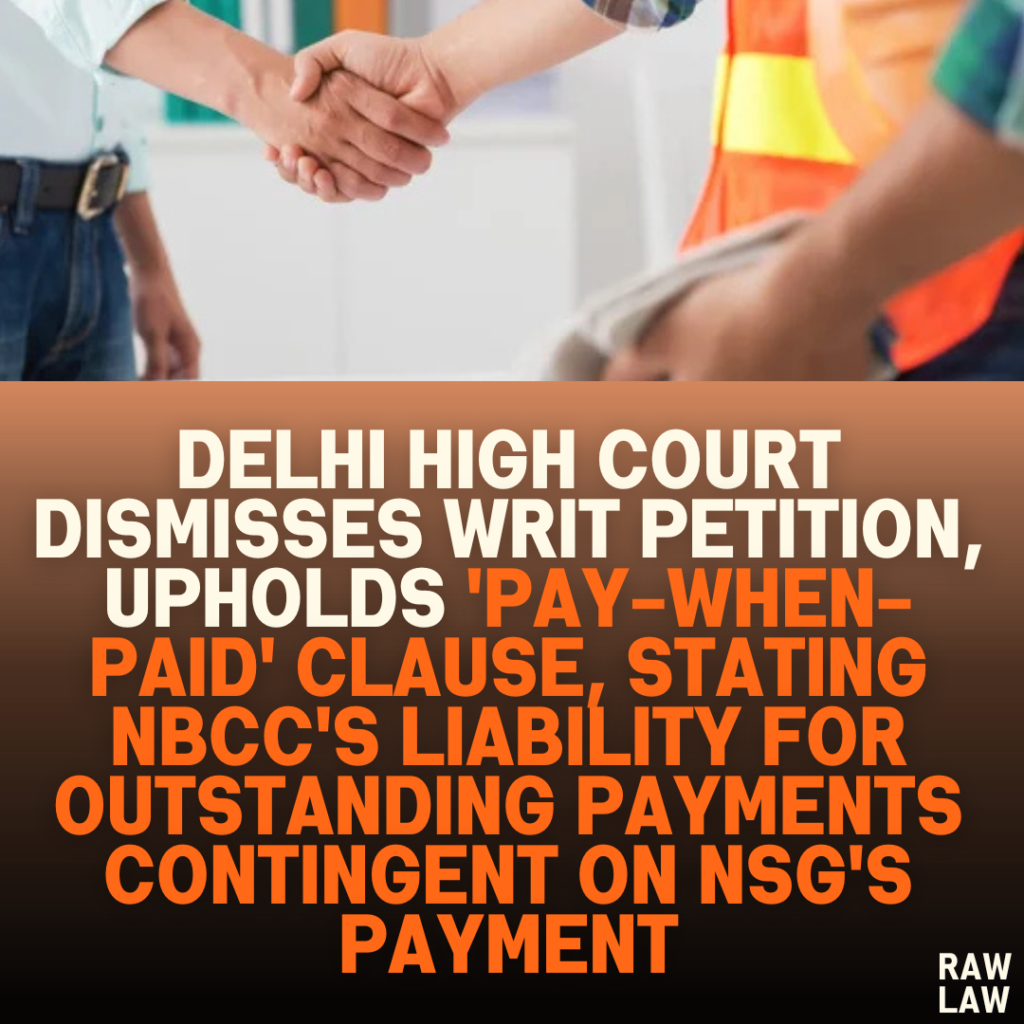Court’s Decision:
The Delhi High Court dismissed the petition seeking the release of outstanding payments from the National Buildings Construction Corporation (NBCC) and upheld the enforceability of the ‘pay-when-paid’ clause in a back-to-back subcontract. The Court ruled that NBCC’s liability to pay the petitioner was strictly contingent upon receiving corresponding funds from the National Security Guard (NSG), the principal employer. The petitioner’s claim for immediate payment was dismissed with liberty to pursue alternate remedies.
Facts:
The petitioner, a subcontractor engaged by NBCC, executed construction work under a back-to-back contract for the NSG’s infrastructure project. Despite fulfilling all contractual obligations, the petitioner claimed that payments amounting to ₹2,12,97,962/- had been unjustifiably withheld by NBCC. The dispute centered around the ‘pay-when-paid’ clause, with NBCC arguing that its payment obligations were dependent on receiving funds from NSG.
Issues:
- Whether NBCC was liable to release the outstanding payments despite non-receipt of funds from NSG.
- Whether the ‘pay-when-paid’ clause was enforceable, barring the petitioner from demanding immediate payment.
Petitioner’s Arguments:
The petitioner argued that NBCC, being an instrumentality of the state, was constitutionally obligated to act fairly and release the payments, especially since the amounts were undisputed. The petitioner emphasized NBCC’s acknowledgment of the outstanding dues, relying on communications where NBCC admitted liabilities of ₹88.47 lakhs and ₹64.31 lakhs. They contended that the non-payment constituted a breach of contract and arbitrary action on the part of NBCC.
Respondent’s Arguments:
NBCC argued that the writ petition was inappropriate for resolving a contractual dispute, and such matters should be adjudicated through civil suits. It further asserted that the impugned contract, including the General Conditions of Contract (GCC), clearly stipulated that the petitioner’s entitlement to payment was contingent upon NBCC receiving payments from NSG. NBCC also contended that any deductions made by NSG against their dues could not form a basis for immediate payment to the petitioner.
Analysis of the Law:
The Court scrutinized the terms of the contract, especially the GCC’s Clause 24.2, which explicitly linked NBCC’s obligation to pay the petitioner to its receipt of funds from NSG. The Court referred to precedents where similar ‘pay-when-paid’ clauses were upheld, reinforcing the principle that such contractual terms must be respected unless they are grossly unfair or ambiguous.
Precedent Analysis:
The Court examined relevant precedents, including National Projects Construction Corporation Ltd. v. Harvinder Singh & Company, where a back-to-back clause was scrutinized. In that case, the Court emphasized the need for contractors to fulfill payment obligations, even in the absence of payments from the principal employer. However, the Court distinguished this case, noting that in the present matter, the ‘pay-when-paid’ clause was unambiguous, leaving no room for interpretation.
Court’s Reasoning:
The Court concluded that the petitioner’s demand for immediate payment could not be sustained in light of the clear terms of the contract. The ‘pay-when-paid’ clause established that NBCC was not obligated to release payments until it received the corresponding funds from NSG. The Court emphasized that the petitioner had entered into the contract fully aware of these conditions, and there was no challenge to the validity of the contractual terms.
Conclusion:
The Court dismissed the writ petition, holding that NBCC’s liability to pay the petitioner was contingent upon receiving payments from NSG. The Court granted the petitioner the liberty to pursue alternate remedies, such as civil or arbitral proceedings, to recover the dues.
Implications:
This ruling reaffirms the enforceability of ‘pay-when-paid’ clauses in back-to-back contracts, highlighting that such clauses must be upheld unless they are deemed arbitrary or violate public policy. The decision also underscores the importance of contractual clarity and the challenges subcontractors face when disputes arise in multi-tiered contractual arrangements.




Pingback: Chhattisgarh High Court Orders Handwriting Expert Examination of Alleged Manipulated Diary Entries, Terms Trial Court’s Rejection as Pervasive and Must Be Set Aside - Raw Law